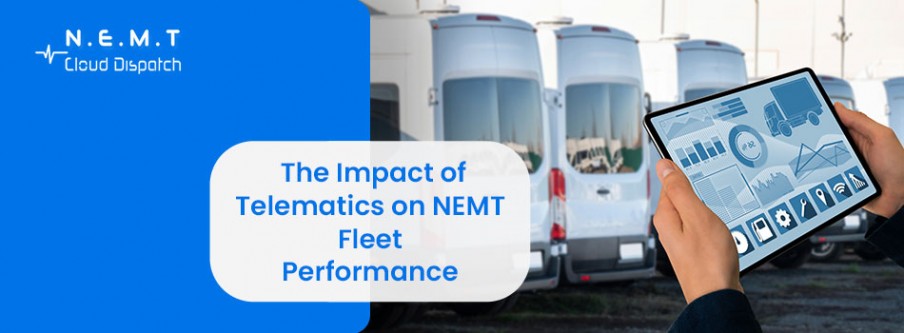Managing an NEMT fleet involves unique challenges, including ensuring timely pickups and drop-offs, maintaining vehicle safety, and managing costs. Telematics technology has emerged as a powerful tool to improve NEMT fleet performance by enhancing efficiency, safety, and cost-effectiveness. At NEMT Cloud Dispatch, let’s discuss how telematics technology is transforming NEMT fleet management and its impact on overall performance.
What is Telematics?
Telematics is a combination of telecommunications and informatics. It involves using devices and software to gather and transmit data about a vehicle’s location, speed, fuel consumption, driving behaviour, and other important metrics. Telematics systems are typically composed of GPS technology, sensors, and onboard diagnostics, which help track vehicle movements and conditions in real-time. In the context of NEMT, telematics provides valuable insights into fleet operations, helping to improve efficiency and service quality.
How Telematics Enhances NEMT Fleet Performance
Implementing telematics technology in NEMT fleets significantly influences several aspects of fleet management. The main benefits include enhanced operational efficiency, improved driver safety, reduced costs, and better compliance with regulations. Further, a higher level of service for patients. Let’s explore these impacts in detail.
1. Enhanced Operational Efficiency
Telematics helps NEMT providers optimize their fleet operations by offering real-time data on vehicle locations, traffic conditions, and route efficiency. With access to this information, dispatchers can make informed decisions about trip scheduling and routing, ensuring that vehicles take the most efficient paths to reach their destinations. This reduces travel time, minimizes delays, and enhances service punctuality.
Optimizing Routes: Telematics systems allow for dynamic route optimization, where routes are adjusted in real-time based on current traffic conditions. For NEMT services, this is crucial for timely patient pickups and drop-offs, especially when medical appointments or treatments are time-sensitive.
Reducing Idle Time: Telematics provides data on vehicle idling, allowing fleet managers to identify and reduce unnecessary engine running time. This not only conserves fuel but also decreases wear and tear on the engine, improving the lifespan of vehicles.
2. Improved Driver Safety
Driver safety is paramount in NEMT services, as vehicles often transport patients who require special care. Telematics technology helps monitor and improve driver behaviour, leading to safer trips for passengers.
Monitoring Driving Behavior: Telematics can track driving behaviours such as speeding, harsh braking, and rapid acceleration. Fleet managers can use this data to identify risky drivers and provide targeted training to promote safer driving habits.
Encouraging Safe Driving: Some telematics systems offer in-cab feedback to alert drivers in real time if they exceed speed limits or engage in unsafe driving behaviours. These alerts can help drivers adjust their driving practices immediately, reducing the risk of accidents.
3. Reduced Operational Costs
Telematics plays a significant role in cost reduction by enabling more efficient resource management. Fuel expenses, maintenance costs, and insurance premiums can be significantly reduced through the use of telematics.
Fuel Efficiency: By monitoring fuel consumption and identifying fuel-wasting behaviors telematics helps NEMT providers reduce fuel costs. Optimizing routes also minimizes unnecessary fuel usage.
Proactive Maintenance: Telematics allows for real-time tracking of vehicle health metrics, such as engine performance, battery voltage, and tyre pressure. Fleet managers can schedule maintenance based on actual vehicle conditions rather than fixed schedules, preventing breakdowns and avoiding costly repairs.
Lower Insurance Premiums: Insurance companies may offer discounts to NEMT providers that use telematics to promote safer driving and maintain vehicle health. The data collected by telematics systems serves as evidence of responsible fleet management, potentially leading to reduced premiums.
You May Also Read:How to Reduce Cost in NEMT Business?
4. Better Compliance with Regulations
The NEMT industry is subject to various regulatory requirements, including driver qualifications, vehicle maintenance standards, and record-keeping. Telematics helps NEMT providers stay compliant by simplifying the process of tracking and reporting necessary data.
Electronic Logging: Telematics can be used to electronically log driver hours, maintenance schedules, and vehicle inspections. This ensures that all records are up-to-date and easily accessible for audits or regulatory reviews.
Compliance Alerts: Fleet managers can set up alerts to notify them when vehicles are due for inspections, registrations, or other regulatory requirements. This helps prevent lapses in compliance, which can lead to fines or legal issues.
5. Higher Level of Service for Patients
In NEMT, providing a high level of service is essential for ensuring patient satisfaction and safety. Telematics technology can improve the patient experience by ensuring timely service and enabling a higher standard of care.
Timely Pickups and Drop-Offs: Real-time tracking allows NEMT providers to give patients accurate ETAs for pickups and drop-offs. This reduces patient anxiety and helps ensure they arrive on time for medical appointments.
Emergency Response: In the event of a medical emergency during transit, telematics systems can quickly provide the vehicle’s location to emergency responders, allowing for faster assistance.
Conclusion
Telematics has a transformative impact on NEMT fleet performance by enhancing operational efficiency and delivering a better service experience for patients. As telematics technology continues to advance, NEMT providers can further optimize their services, making non-emergency medical transportation more reliable, efficient, and cost-effective. Embracing telematics is not just a step toward modernization. It’s a crucial move to meet the evolving demands of the NEMT industry and ensure the well-being of patients who rely on these services.


